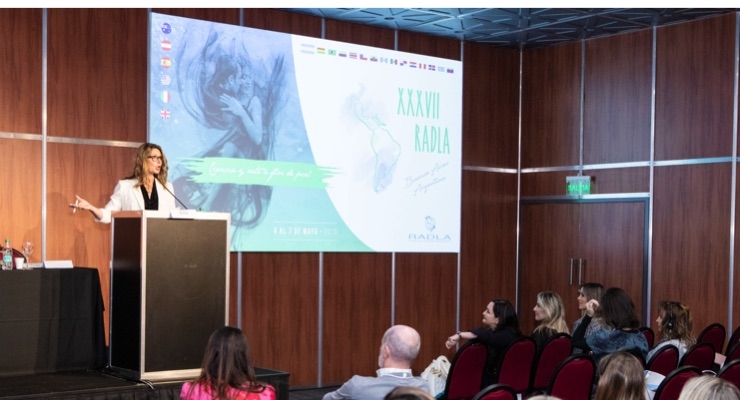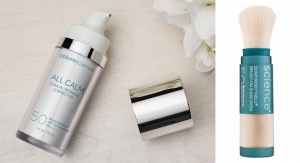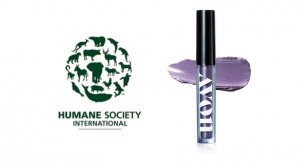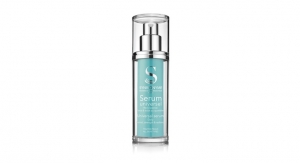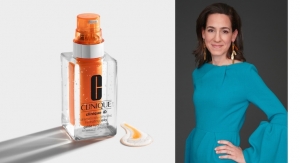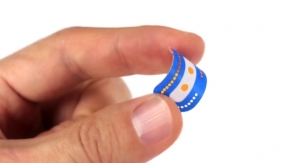05.14.19
Mary Kay presented findings from two research studies at the Reunión Anual de Dermatólogos Latinoamericanos and the 77th Annual Meeting of the Society for Investigative Dermatology
Dallas-based Mary Kay Inc., presented findings from two research studies at two recent global dermatological conferences: the Reunión Anual de Dermatólogos Latinoamericanos (RADLA, May 4–7 in Buenos Aires, Argentina )and the 77th Annual Meeting of the Society for Investigative Dermatology (May 8–11 in Chicago).
In Argentina, Mary Kay presented findings related to the effects of pollution on skin health. In Chicago, the company revealed its latest research on how five fruit extracts known to contain vitamin C work to help skin appearance.
During the 37th annual RADLA conference in Argentina, Mary Kay presented research focused on skin concerns stemming from diesel exhaust particles (DEP) in the environment: Continued exposure to DEP increases free radicals in skin cells, which can ultimately impact premature signs of skin aging, like dark spots and dullness. To address these effects, Mary Kay also presented findings on an antioxidant complex that can help delay the premature signs of aging related to the damaging effects of DEP. According to the direct seller, this breakthrough technology, found in the Mary Kay TimeWise Miracle Set 3D skincare line, “provides a powerful free-radical regimen with an exclusive, patent-pending, three-dimensional approach to skin aging.”
“Mary Kay scientists spent years researching the latest ingredient innovations to develop our newest skincare collection that defends against free radicals and helps delay the onset of premature skin aging from unavoidable environmental and lifestyle stressors such as car exhaust and air pollution,” said Dr. Lucy Gildea, chief scientific officer at Mary Kay Inc.
In Chicago, at SID, Mary Kay associate principal scientist Tiffany Carle presented new data collected while analyzing the effects of a serum containing five botanical fruit extracts known to be rich in vitamin C on skin appearance. As part of this study, Mary Kay researchers treated artificial skin tissue with this serum and utilized a genomic approach to understand how the serum affected the skin. This genomic evaluation revealed involvement of four main classes of genes important for skin firmness. Furthermore, the study showcased that the serum treatment increased production of dermal matrix proteins collagen and laminin that support skin firmness. This study confirms how the serum works to help improve the appearance of skin laxity and texture.
PHOTO: Dr. Lucy Gildea, chief scientific officer at Mary Kay Inc. presenting at RADLA. (Photo: Mary Kay Inc.)
Dallas-based Mary Kay Inc., presented findings from two research studies at two recent global dermatological conferences: the Reunión Anual de Dermatólogos Latinoamericanos (RADLA, May 4–7 in Buenos Aires, Argentina )and the 77th Annual Meeting of the Society for Investigative Dermatology (May 8–11 in Chicago).
In Argentina, Mary Kay presented findings related to the effects of pollution on skin health. In Chicago, the company revealed its latest research on how five fruit extracts known to contain vitamin C work to help skin appearance.
During the 37th annual RADLA conference in Argentina, Mary Kay presented research focused on skin concerns stemming from diesel exhaust particles (DEP) in the environment: Continued exposure to DEP increases free radicals in skin cells, which can ultimately impact premature signs of skin aging, like dark spots and dullness. To address these effects, Mary Kay also presented findings on an antioxidant complex that can help delay the premature signs of aging related to the damaging effects of DEP. According to the direct seller, this breakthrough technology, found in the Mary Kay TimeWise Miracle Set 3D skincare line, “provides a powerful free-radical regimen with an exclusive, patent-pending, three-dimensional approach to skin aging.”
“Mary Kay scientists spent years researching the latest ingredient innovations to develop our newest skincare collection that defends against free radicals and helps delay the onset of premature skin aging from unavoidable environmental and lifestyle stressors such as car exhaust and air pollution,” said Dr. Lucy Gildea, chief scientific officer at Mary Kay Inc.
In Chicago, at SID, Mary Kay associate principal scientist Tiffany Carle presented new data collected while analyzing the effects of a serum containing five botanical fruit extracts known to be rich in vitamin C on skin appearance. As part of this study, Mary Kay researchers treated artificial skin tissue with this serum and utilized a genomic approach to understand how the serum affected the skin. This genomic evaluation revealed involvement of four main classes of genes important for skin firmness. Furthermore, the study showcased that the serum treatment increased production of dermal matrix proteins collagen and laminin that support skin firmness. This study confirms how the serum works to help improve the appearance of skin laxity and texture.
PHOTO: Dr. Lucy Gildea, chief scientific officer at Mary Kay Inc. presenting at RADLA. (Photo: Mary Kay Inc.)

